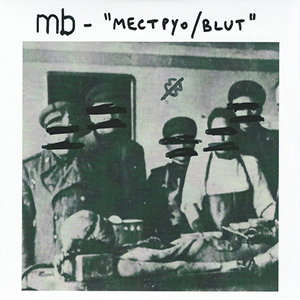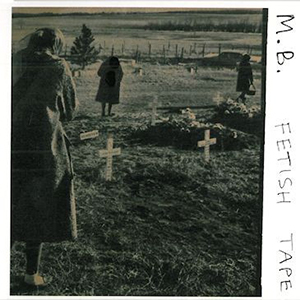MB, "Mectpyo/Blut", "Fetish Tape"
 Here are two new archival releases from Bianchi, who has been more prolific in reissuing early (and usually more well regarded) releases compared to new material in the past few years. These discs (both CD versions of limited cassettes issued in the early 1980s) capture Bianchi in transition, moving from his less focused early work as the Sacher-Pelz moniker, into what most associate with the MB name and his string of amazing, but depressing LPs in the early 1980s. While the material might not be as strong as something on, say, Symphony for a Genocide or Regel, it is still much more than simple.
Here are two new archival releases from Bianchi, who has been more prolific in reissuing early (and usually more well regarded) releases compared to new material in the past few years. These discs (both CD versions of limited cassettes issued in the early 1980s) capture Bianchi in transition, moving from his less focused early work as the Sacher-Pelz moniker, into what most associate with the MB name and his string of amazing, but depressing LPs in the early 1980s. While the material might not be as strong as something on, say, Symphony for a Genocide or Regel, it is still much more than simple.
Both were released in 1980, but the two disc Mectpyo/Blut set (originally two cassettes) is early on into his transition using his own name.Because of that, the four pieces that comprise the set are more in line with those early Sacher-Pelz tapes:more experimental and diverse, but also less focused."Maidanek Bakterium", however, begins more like classic MB:distorted tape loops and broken rhythm machines drift along, locked in a definite loop but exhibiting subtle changes, like the sound of decay.At times, he transitions to less harsh tape manipulations of pre-recorded music, but goes out on a rawer note.
The following "Musique Belzec" starts with cheap echo-effect noise and shrill raygun like squeaks before settling into a groove based on a crudely manipulated tape of percussion.It is this jerky sort of beat, nowhere near steady, that ends up propelling the piece, and it leads to a junky, yet memorable structure that is reminiscent of the best Merzbow from the era.On the second disc, both "Mutant Brain" and "Mord Bahnhof" are comparatively simpler affairs.The first is heavily built upon Bianchi starting and stopping tape recordings, and with its filtering and odd musical source material, resulting in a sparse, less captivating piece of music.The final "Mord Banhoff" sees Bianchi working with rising and falling pitch bends, leading to an almost sea-sickness like sensation that transitions into abrasive detuned radio.It has a looser construction than much of his work, but it still coalesces very well.
samples:
 
 Fetish Tape may have been recorded earlier in 1980, but the two pieces that make up this early release are closer to the style he honed during his prestigious 1981-1983 run of LPs.The first of the two untitled pieces features open space and a semblance of rhythm, as a bass-synth like passage propels it into a more industrial framework.It is relatively simple in its composition, but the sense of order and structure is more composed and less chaotic than some of his early works, transitioning nicely between looser spaces and grinding noise.
Fetish Tape may have been recorded earlier in 1980, but the two pieces that make up this early release are closer to the style he honed during his prestigious 1981-1983 run of LPs.The first of the two untitled pieces features open space and a semblance of rhythm, as a bass-synth like passage propels it into a more industrial framework.It is relatively simple in its composition, but the sense of order and structure is more composed and less chaotic than some of his early works, transitioning nicely between looser spaces and grinding noise.
The second piece is slower, but somehow less depressive sounding than many of his latter works.There are sludgy, sustained passages of synth buzz and detuned radio that are similar to what he would work with brilliantly just a few years later.Here it is a bit less focused, and at times drifts into more textural-heavy, musique concrete realms than the standard proto noise/power electronics style his work is most associated with, but all the important parts are definitely here and working together to create some unique sounding work.
While I am happy with these transfers of previously impossible to find (other than nth generation bootlegs) or never available private tapes, they clearly show an artist in development.I, like many, are more than happy to delve deeply into these early Maurizio Bianchi releases and all of the lo-fi tape noise and broken effects unit splendor, but it is not everyone’s cup of tea.For more casual fans that have only a passing knowledge of his work, consider these to be akin to rough demos when set alongside his more noteworthy material.
samples:
 



